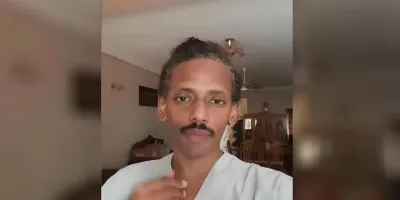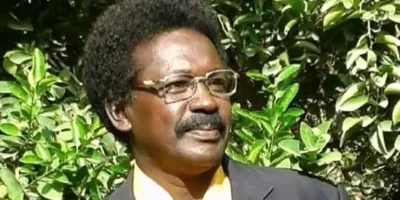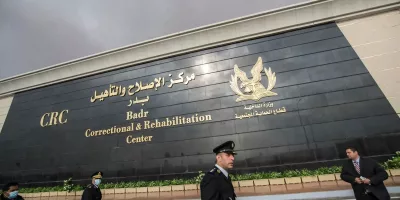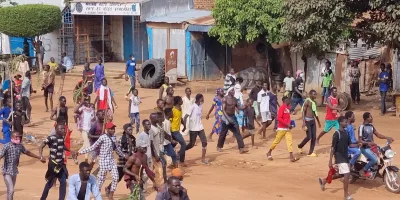The sixth day of COP27 coincided with the 11/11 plan for protests, as called for by a number of Egyptian opposition activists abroad. The call for protests prompted strict security measures across the country as security forces were on high alert, according to CFJ eyewitnesses. Meanwhile, a number of government services, including public transportation, announced their suspension. Additionally, security services detained another brother of the YouTuber Abdullah el-Sharif, who has been supportive of the 11/11 call for protests.
Pro-government protests:
A number of pro-government participants in COP27 in Sharm El-Sheikh held a protest calling for “dropping Egypt’s debts”.
On the other hand, Climate Action Network International (CAN) published a photo of the space given by the climate conference management to hold its organizational meeting of more than 100 people. The place is a tiny space without a proper shield from the sun, and was not appropriate for holding a meeting. CAN described what happened “disrespectful” for civil society.
Vice News reporter Matthew Cassel posted several personal observations following his team’s return from the conference. He underlined the severe security restriction of freedom of movement between the conference areas, evidenced by a video of an incident of barring the movement of an Egyptian young man by bicycle between the civil society zone and outside it. He added that the areas designated for protest were far from the conference venue and witnessed strict security measures, although the only protests that these areas witnessed were organized by loyalists of the Egyptian regime. He said that practices such as periodic checks of passports and photographing them with personal phones were common. Concerns raised about the COP27 smartphone application made participants feel monitored all the time. Cassel indicated that the arrival of Sanaa Seif and what was raised by her press conference was a turning point that made the issue of human rights in Egypt the focus of attention, and that the release of her brother Alaa Abdel-Fattah before the climate summit would have spared the Egyptian government a lot of trouble.
Biden raises human rights issue with Sisi:
In conjunction with the arrival of US President Joe Biden to Sharm el-Sheikh to attend the climate summit, Nancy Pelosi, Speaker of the US House of Representatives, reportedly said that she stressed with President Sisi the importance of human rights in Egypt and that human rights is a priority for the US delegation to the Climate Summit. A state-affiliated news platform published a video clip of the meeting between the two presidents, in which Sisi spoke about Egypt’s keenness to improve its human rights record. He cited the formation of the presidential pardon committee, and the launch of the National Human Rights Strategy, which he suggested were signs of progress. The US president’s response – which was lost in translation- was to thank the Egyptian president for reminding him of the civil rights crisis in Egypt, which requires an urgent solution.
Alaa Abdel-Fattah’s case:
Regarding the case of hunger-striking detainee Alaa Abdel-Fattah, the Public Prosecution issued a statement Thursday claiming that it ordered an investigation into Abdel-Fattah’s complaint requesting that he be transferred to a hospital to follow up on his health for his hunger strike, but that he refused to be transferred to a hospital and that he was satisfied with the prison conditions. The prosecution, however, claimed that it oversaw a medical examination on the detainee(without specifying the date), the result of which was that his “vital signs are within their natural limits”, that his hunger strike is “questionable”, and that his health condition does not require his transfer to the medical center.
For her part, Abdel-Fattah’s mother Laila Soueif dismissed the Public Prosecution’s statement as full of fallacies, lies and half-truths, and that her son did not receive a family visit on November 7 as claimed by the statement, but rather the family was allowed to send him a delivery of books, clothes and letters, without seeing him, and that she waited outside the prison all day until 9 pm to get a letter from him, but the prison administration claimed that there was no letter. She added that the prosecution statement overlooked two main demands: seeing his lawyers and receiving a visit from the British consulate. She also questioned the truth of what was stated in the statement about Abdel Fattah’s health condition. Meanwhile, a number of United Nations special experts on Friday called for Abdel-Fattah’s immediate release.






